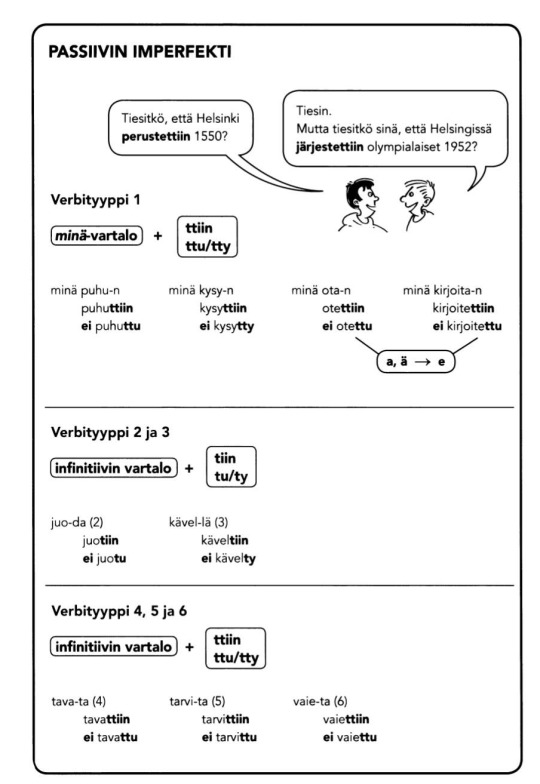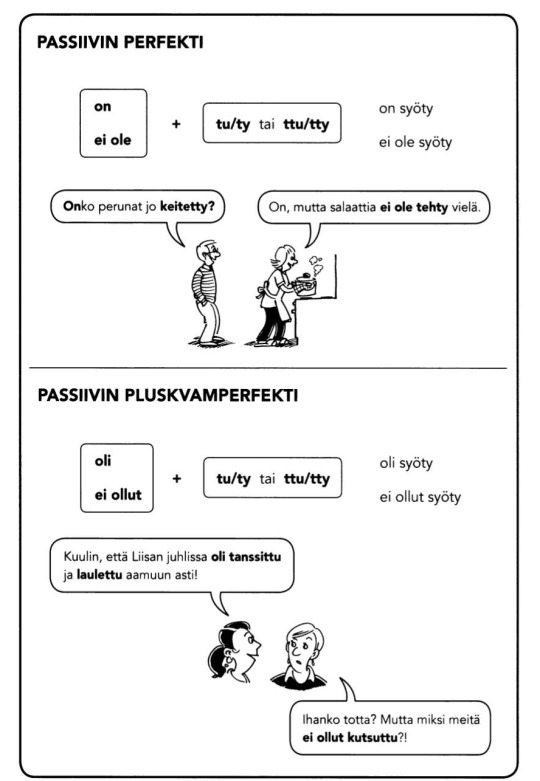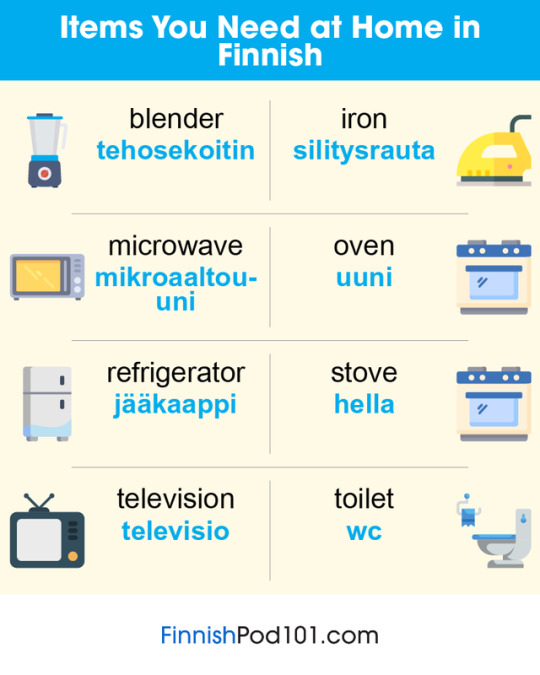#finnishgrammar
Text
"minua nuorempi"
A useful structure in Finnish is the "minua nuorempi" form, which translates to mean "younger than me". To make this form the first word "me" is placed in partitive form ("minua") and the second word "younger" is in the basic form ("nuorempi").
There is thus no need for anything else such as "kuin" (than). The fact the first word is partitive is enough to indicate the meaning. Some more examples:
häntä pidempi = taller than him
meitä fiksumpi = smarter than us
This gets a bit more complicated when this form is placed into a longer sentence. The partitive part remains completely unchanged, but the second part must be conjugated as required by the sentence. If you know how to conjugate adjectives in Finnish as required for the sentence, this is done in the same way (which makes sense because these are just -mpi words are adjectives in the comparative form):
Lähetin sen minua fiksummalle ihmiselle. = I sent to a person who is smarter than me.
Ostin sen häntä pidemmältä mieheltä. = I bought it from a man taller than him.
...
Used with genitive form
A small rule (for written Finnish) I've noticed is when using the "genitive form" such as is needed for "puhua jonkun kanssa" it is better to use "itse" than "minua":
Puhuin minua nuoremman pojan kanssa. = I spoke with a boy who is younger than me
Puhuin itseäni nuoremman pojan kanssa. = I spoke with a boy who is younger than me.
Another example:
Hän meni naimisiin häntä nuoremman miehen kanssa. = She married a man younger than herself.
Hän meni naimisiin itseään nuoremman miehen kanssa. = She married a man younger than herself.
...
Adverbs
I have also noticed this form can be used with "adverbs" (nopeammin) as well as "adjectives" (nopeampi). So for example:
Yritä tehdä se minua nopeammin! = Try to do it faster than I am!
31 notes
·
View notes
Text
Suomen Mestari 3. - Unit 3.
Grammar - Passive past tense
See my earlier grammar post on the passive


19 notes
·
View notes
Photo

🔌⚡ Items you need at home in Finnish! PS: Learn Finnish with the best FREE online resources, just click here: https://www.finnishpod101.com/?src=social_special_infograph_home_items_061819
6 notes
·
View notes
Text
Aika vs. ajanvaraus
A tiny comment about appointment making in Finnish. You'll often see the word "ajanvaraus", which refers to the process of making an appointment. You'll often see "ajanvaraus" as an option on a website.
ajan [time ("aika") in the genitive form] + varaus [reserving/reservation] = reversing of a time
But some dictionaries give this to mean "appointment", which is a bit misleading.
If you want to refer to having an appointment is better to just use "aika", such as
Minulla on lääkäriaika huomenna. = I have a doctor's appointment tomorrow.
Voit varata ajan netin kautta. = You can reserve an appointment through the net.
24 notes
·
View notes
Text
oman []-n kustannuksella = at the expense of one's own []
For example:
oman onnellisuuden kustannuksella = at the expense of one's own happiness
Examples:
Autatko muita oman jaksamisesi kustannuksella? = Do you help others at the expense of your own health? [Note: jaksaminen = having the energy/resources to do something, a bit hard to translate to English].
Sähkötöitä tehdään yhä oman turvallisuuden kustannuksella. = Electrical work is still done at the expense of the individual's safety.
14 notes
·
View notes
Text
Välinen aika -> how to conjugate in Finnish
One phrase I have had trouble with is "välinen aika", and how it is used for expressing time/dates etc. Basically I never know when to put it in the genitive form ("välisen ajan") and when to put it some other form, but here are some examples:
-> välisen ajan
This seems to be used whenever referring to something being a certain state between two dates - such being on holidays between date A and B.
Tarjous on voimassa 14:nnen ja 30:nnen toukokuuta välisen ajan. = The offer is valid between 14-30 May.
Olen lomalla 28.3. ja 20.4 välisen ajan. = I am on holidays between 28.3-20.4.
Kauppa on kiinni 2.5. ja 5.5. välisen ajan. = The store is closed between 2.5 and 5.5.
-> välisenä aikana
It seems like this form "välisenä aikana" can also be used to indicate over what time period something has occurred, such as:
Tutkimukset on tehty 1.1. ja 1.6.22 välisenä aikana. = The research has been done between 1.1 and 1.6.22.
I'm not sure how "incorrect" or "clumsy" is would be to say:
Kirjasto on suljettu 1.1. ja 3.1.22 välisenä aikana.
or whether it works better with the verb "pitää", such as:
Kirjasto pidetään suljettuna 1.1. ja 3.1.22 välisenä aikana.
But ultimately it seems this "-na" form isn't really needed when talking about a range of dates.
-> välisellä ajalla
On some occasions it is also possible to use "välisellä ajalla" form (for the time period of...), such as:
Räjäytykset toteutetaan arkipäivisin klo 8-18 välisellä ajalla. = The blasts will be carried during working dates between 8 am and 6 pm.
#finnish langblr#finnish#finnishgrammar#corrections welcome#did i miss any important uses of välinen aika?
16 notes
·
View notes
Text
Verb of the day: parantaa
parantaa = to improve [trans]
-> Note how this verb is [often? always?] used with partitive.
Haluan parantaa suomen kielen taitoani. = I want to improve my Finnish.
Tarkoituksena on vähentää köyhyyttä ja parantaa ihmisten oloja. = The purpose is to reduce poverty and improve people's (living) conditions
13 notes
·
View notes
Text
Verb of the day: suositella
suositella = to recommend
-> This is a partitive verb: this means the thing being recommended will always be in the partitive form (no exceptions!)
Examples:
Voiko joku suositella hyviä kirjoja minulle? = Can someone recommend some good books to me?
Voin suositella tätä kirjaa. = I can recommend this book.
Tuota hotellia minä en voi suositella. = I can't recommend that hotel.
13 notes
·
View notes
Text
Haltu-
hallussa = in the possession of
Hänen hallussansa on asiakirja, jonka tarvitsen. = He has in his possession a document that I need.
haltuun = into the possession of
Sain asiakirjan haltuuni. = I took the document into my possession.
A common verb is: ottaa haltuun = to take possession of, to seize, to control, to take over, etc. Examples:
Entinen sotilas otti tilanteen haltuun. = A former solider took control of the situation.
Hän otti yrityksen instagram-tilin haltuun. = He took over control of the company's instragram account.
12 notes
·
View notes
Text
Verb of the day: pukeutua
pukeutua johonkin = to dress (in something)
-> used with the "mihin" form (eli johonkin)
Examples:
Hän pukeutui kauluspaitaan, solmioon, tupakkatakkiin ja suoriin housuihin. = He was dressed in a dress shirt, tie, smoking jacket and straight pants.
Hän ei halua pukeutua mekkoon. = She doesn't want to wear a dress.
12 notes
·
View notes
Text
Häräntappoase
Earlier I tried to read "Häräntappoase" and it was pretty challenging as it is written in spoken Finnish with a lot of dialect words. Now I found the "selkokieli" (easy language) version of it and decided to read this instead and have also picked up some new vocab.
Chapters 1-4, new words
Verbs
vilkuilla = to glance at
järkätä (eli järjestää) = to arrange
kailottaa = to holler, to talk loudly
kömpiä = to move clumsily
kiikuttaa = to rock back and forth (trans)
jorista = to chitchat
viillellä = to incise, to slice
kehrätä = to purr (cat)
saapastella = to strut (to walk)
hihitellä = to snicker
lompsia = to pace, to stomp
Other
häirikkö = trouble maker
sänki = stubble (hair)
pilvilinna = pipe dream (literally: cloud castle)
linkkari =pocket knife
korpi = backwaters ("the sticks")
älyvapaa = non-sensical (literally: intelligence-free)
A few quotes:
Olin joutunut orjaksi korpeen. = I had ended up as a slave in this back water town.
Lahja tuli navetassa vastaan ja alkoi älyvapaan puheen. = Lahja appeared in the barn and started talking nonsense.
Mä katsoin Taalaa. Se viilteli linkkarilla nimikirjaimiaan tuolin selkämykseen. = I watched Taala. He was carving his initials into the back of the chair.
13 notes
·
View notes
Text
Verb of the day: kietoa
kietoa = to entwine, to wrap (around)
Hän kietoi kätensä ympärilleni. = He wrapped his arms around me
Hänen hiuksena oli kiedottu höllästi kiinni. = Her hair was tied back loosely.
kietoa pikkusormen ympärille = to have [someone] wrapped around [your/their] little finger
Hän kietoi muut pikkusormensa ympärille. = He has the others wrapped around his little finger.
6 notes
·
View notes
Text
Genitive + ksi
Genitive (-n) + verb in translative form (-ksi):
This structure can be used to indicate some kind of change in state. The "situation" changing is given in genitive form (-n) and the change happening (the verb) is in translative form (-ksi):
-> tilanteen helpottamiseksi = for the easing of the situation
Tilanteen helpottamiseksi on monia ratkaisuja. = There are many solutions to ease/improve the situation.
-> palvelujen parantamiseksi = for the improvement of services
Uusi laatusuositus palvelujen parantamiseksi on ilmestynyt. = A new quality recommendation for the improvement of services has been published.
-> kosteuden ehkäisemiseksi = for the preventing of moisture
Tutkimuksen tarkoituksena on pohtia ratkaisuja kosteuden ehkäisemiseksi eri rakenteissa. = The purpose of the research is to weight up solutions for preventing moisture in different structures.
6 notes
·
View notes
Text
Verb of the day: särkeä
särkeä = to [make something] feel sore /to break [something]
särkeä = to feel sore [transitive verb, used with partitive]
Päätä särkee. = Head aches / Head is aching. [Note: Päänsärky = headache]
Jalkojani särkee. = My legs are hurting.
Alternatively the form work with illative ("mihin"-form):
Jalkoihini särkee. = My legs are hurting.
2. särkeä = to break [trans]
Särjin hänen sydämensä. = I broke his heart.
(It doesn't have to be only about breaking hearts, it can also be more literally breaking something into piece, but this "breaking hearts" phrase is perhaps what first comes to mind with the verb "särkeä")
7 notes
·
View notes
Text
Mikään - Any
mikään (nominative) - any, anything
mitään (partitive)
minkään (genitive)
millään
miltään
millekään
missään
mistään
mihinkään
ei mikään - nothing
mitkään (nominative plural)
The pronoun ‘mikään’ is used in negative sentence and in questions.
Examples
Mikään ei ole täydellistä. - Nothing is perfect.
Ei mitään uuta auringon alla. - There is nothing new under the sun.
Tämä ruoka ei maistu miltään. - This found has no taste.
Oletko sinä kuullut mitään siitä? - Have you heard anything about it?
Mitkään muut keinot eivät tässä tilanteessa auta. - No other means will help in this situation.
Note:
Hänellä ei ole rahaa. - He hasn’t got any money.
But to emphasize that he really has none, use yhtään, lainkaan or ollenkaan.
Hänella ei ole yhtään rahaa. - He has absolutely no money.
However, you can use ‘yhtään’ and ‘mitään’ together to make something meaning ‘absolutely nothing’:
En tiedän yhtään mitään siitä. - I know absolutely nothing about it.
Expressions
Sille ei voi mitään. - That can’t be helped
Hänestä ei ole mihinkään. - He is good for nothing.
En millään voi tulla aikaisemmin. - I can’t possibly come earlier.
42 notes
·
View notes
Text
Participles - The agent
Reference: Finnish for Foreigners 2*
The agent participle (agenttipartisiippi) is used to describe who is doing or has done an action.
How to form:
-Find the ‘he’ form of the verb, and remove -vat/vät and then add ma/mä:
tehdä - tekevät - tekemä
How to use:
-This form is used in conjunction with the genitive form for whoever is doing/has done the action.
-The agent participle needs to be put into the correct form, such as partitive for a partitive verb.
-Use the appropriate possessive ending (-ni, -si, etc.)
Examples
(1) Hamletin kirjoitti Shakespeare. - Shakespeare wrote Hamlet.
becomes
Hamlet on Shakespearen kirjoittama. - Shakespeare wrote Hamlet. (I didn’t bother changing the english translation here, because basically we don’t have this form in English.)
(2) Tämän ruuan on valmistanut raskalainen kokki. - This food has been prepared by a French cook.
becomes
Tämä ruoka on ranskalaisen kokin valmistamaa. - This food has been prepared by a French cook. (Perhaps you could also translate as: “This food is French cook prepared”, but it is unlikely to ever actually be used in English.)
(3) Sain lahjaksi Liisan kutoman liinan. - I received as a present a tablecloth woven by Liisa. (verb is ‘kutoa’ - to weave)
(4) Turku oli minun ensimmäinen näkemäni kaupunki Suomessa. - Turku was the first city I saw in Finland.
(5) Minä pidän eniten äitini tekemästä ruoasta. - I like best food made by my mother.
*I finally got Finnish for Foreigners 2 from the library. I read the pdf of Finnish for Foreigners 1 a while ago and even though this series is really old, I think the grammar explanations are good. Warning: Finnish for Foreigners 2 seems to be pretty sexist, so every female character is a homemaker or a caregiver.
28 notes
·
View notes